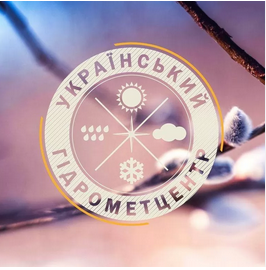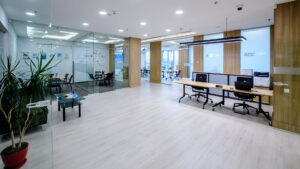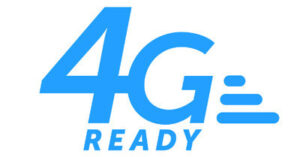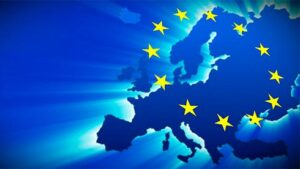
On Thursday, November 21, moderate snow is expected in western regions of Ukraine at night and in some places light snow in the afternoon, reports Ukrhydrometcenter. The temperature at night 0-5 °, in the Carpathians up to 8 ° frost, in the afternoon about 0 °.
In Zhytomyr, Kyiv, Chernihiv, Vinnitsa and Cherkassy regions, wet snow and rain, heavy precipitation in some places at night, sticking wet snow. The temperature at night and during the day is 0-3° of heat. In the rest of the area moderate, in some places heavy rains. Temperatures are 5-10° warm at night, up to 14° in Crimea, 7-12° during the day, 13-18° in the south-east of the country. In the western, most northern and Vinnitsa regions there is icy road ice on the roads.
The wind is predominantly north-westerly, at night on the Left Bank southern, 7-12 m/s. Throughout Ukraine, except for western and most northern regions, gusts of 17-22 m/s.
In Kiev at night heavy, in the afternoon moderate rain and wet snow, icy roads. The wind is north-westerly, 7-12 m/s. The temperature at night and in the daytime 0-2° of heat.
According to the Central Geophysical Observatory named after. Boris Sreznevsky, the highest temperature during the day on November 21 in Kiev was recorded in 1926 and amounted to 16.1 ° heat, the lowest at night – 15.3 ° below zero in 1890.
On Friday, November 22, at night without precipitation, only in the eastern regions and in the extreme west of the country, in the afternoon in Ukraine, except for southern and eastern regions, moderate snow, snowstorm, in the Carpathian region significant snow;
Wind south with transition to north-western, 7-12 m/s. In the southern part, in the afternoon in central and northern regions gusts of 15-20 m/s in some places.
In the west, most of the north, Vinnitsa and Cherkassy regions, roads are icy.
The temperature at night is 1-6° frost, in the south of the country about 0°. During the day in western and northern regions from 3° frost to 2° warm, in the rest of the territory 0-5° warm, in the south of the country 6-11° warm.
In the Carpathians, light snow at night and heavy snow in the afternoon. Temperatures at night 5-10°, in the afternoon 2-7° of frost.
In Kiev, no precipitation at night, snow, snowstorm, south wind, 7-12 m/s, gusts of 15-18 m/s in the afternoon. The temperature at night 3-5° of frost, during the day 0-2° of heat.

The U.S. Embassy in Ukraine is closed in Kyiv on November 20 and recommends that U.S. citizens be prepared to take shelter immediately in the event of an air raid alert.
The office of the American Chamber of Commerce in Kyiv (AmCham) is also closed today. The organization’s team is available online.

In 2023, dairy farms in the European Union produced 160.8 million tons of raw milk, which is 0.8 million tons more than in 2022 and 15.8 million tons more than in 2013, according to a study by Eurostat.
According to it, most of the milk produced in the EU is used for butter and cheese production. Thus, in 2023, 149.3 million tons of raw milk were supplied to dairy plants, which was used to produce a number of fresh and ready-made dairy products.
In turn, EU dairies produced 22.0 million tons of drinking milk and 7.8 million tons of fermented milk products in 2023. At the same time, 58.2 million tons of whole milk and 17.4 million tons of skim milk were used to produce 10.6 million tons of cheese. Another 45.4 million tons of whole milk was used to produce 2.3 million tons of butter, the study says.
Germany became the leader in the production of milk and dairy products in the European Union, accounting for 19% of the total production of drinking milk. It was also a leading producer of fermented milk products (27%), butter (20%) and cheese (22%).
Spain was the second largest producer of drinking milk (15% of the EU total), followed by France (13%). The Netherlands was the second largest producer of fermented milk products (17%), followed by Poland (10%).
France was the second largest producer of both butter and cheese (18% of the EU total for each product). Ireland was third in butter production (13%) and Italy was third in cheese production (13%).

As of September 30, 2024, 4 million 197.37 thousand non-EU citizens who fled Ukraine as a result of the Russian invasion on February 24, 2022, had temporary protection status in the EU, compared to 4 million 163.66 thousand citizens a month earlier, Eurostat reports.
“Compared to the end of August 2024, the largest absolute increase in the number of recipients was observed in Germany (+7,005; +0.6%), Poland (+4,645; +0.5%) and Spain (+3,170; +1.5%),” the agency said.
It noted that the number of beneficiaries decreased in France (-570; -0.9%) and Italy (-10; -0.0%).
Thus, in September, the growth in the number of refugees from Ukraine with temporary protection status slowed to 33.7 thousand from 39.8 thousand in August.
According to Eurostat, despite Germany’s deprivation of almost 237,000 people of this status in July, it still remains the country with the largest number of them in the EU and the world – 1,129,34 thousand at the end of September, or 26.9% of the total number of beneficiaries in the EU.
The top three also includes Poland – 979.84 thousand, or 23.3%, and the Czech Republic – 378.48 thousand, or 9.0%.
Spain (218.30 thousand), Romania (172.41 thousand), and Italy (166.79 thousand) follow with a significant lag.
At the same time, Eurostat clarified that the data for Spain, Greece and Cyprus take into account some people whose temporary protection status is no longer valid.
According to the agency, compared to the population of each EU member state, the largest number of temporary protection beneficiaries per thousand people in September 2024 was observed in the Czech Republic (34.7), Lithuania (28.1) and Poland (26.8), while the corresponding figure at the EU level is 9.3.
It is also said that as of September 30, 2024, Ukrainian citizens accounted for more than 98.3% of the beneficiaries of temporary protection. Adult women accounted for almost half (45.0%) of temporary protection beneficiaries in the EU, children for almost a third (32.3%), while adult men accounted for slightly more than a fifth (22.7%) of the total. A year earlier, the share of women was 46.5%, children 33.7% and adult men 19.9%.
At the end of September 2024, there were also more than 100 thousand people with temporary protection status in Slovakia – 126.97 thousand, the Netherlands – 119.01 thousand, and Ireland – 107.93 thousand.
Between 50 thousand and 100 thousand of them were in Belgium – 84.54 thousand, Austria – 81.91 thousand, Lithuania – 81.07 thousand, Norway – 76.11 thousand, Finland – 67.27 thousand, Switzerland – 66.63 thousand, Bulgaria – 64.32 thousand, Portugal – 63.66 thousand and France – 60.10 thousand (data on children are mostly not included – Eurostat).
This is followed by Latvia – 46.99 thousand people, Sweden – 44.63 thousand, Hungary – 37.99 thousand, Denmark – 36.93 thousand, Estonia – 34.24 thousand, Greece – 31.78 thousand, Croatia – 25.40 thousand, Cyprus – 21.68 thousand, Iceland – 3.92 thousand, Luxembourg – 3.82 thousand, Malta – 2.16 thousand and Liechtenstein – 0.66 thousand.
Eurostat clarified that all the above data relate to the granting of temporary protection on the basis of EU Council Decision 2022/382 of March 4, 2022, which establishes the existence of a massive influx of displaced persons from Ukraine due to Russia’s military invasion and entails the introduction of temporary protection. On June 25, 2024, the European Council decided to extend temporary protection for these persons from March 4, 2025 to March 4, 2026.
According to updated UNHCR data, the number of Ukrainian refugees in Europe as of October 15 this year was estimated at 6.192 million, and 6.752 million in the world as a whole, which is 38 thousand and 27 thousand more than as of September 24 this year.
In Ukraine itself, according to the latest UN data as of August this year, there were 3.669 million internally displaced persons (IDPs), which is 121 thousand more than in April this year.
According to regional authorities cited by the UN, between August 1 and October 3, more than 120,000 people left Donetsk region in eastern Ukraine, including 19,500 who fled active hostilities. In Sumy region, the authorities estimate that 36,000 people, including 6,000 children, have been evacuated.
As noted by Deputy Economy Minister Serhiy Sobolev in early March last year, the return of every 100,000 Ukrainians home results in a 0.5% increase in GDP. In its macroeconomic forecast for this year, the Ministry of Economy has included 1.5 million people returning to Ukraine.
At the same time, the National Bank, in its October inflation report, again downgraded its forecast for the outflow from Ukraine this year from 0.4 million to 0.5 million. In absolute terms, the number of migrants staying abroad is expected to increase to 6.8 million this year.
In the new report, the National Bank confirmed its expectation that Ukrainians will start returning home in 2026, but lowered its forecast for net inflows in 2026 to 0.2 million from 0.4 million.

Kyivstar, the largest mobile operator in Ukraine, intends to invest UAH 1.43 billion in the 1940-1945/2130-2135 MHz and 2355-2395 MHz radio frequency spectrum, the company’s press service said on Tuesday.
It is also specified that the company’s receipt of additional radio frequency spectrum for use for 15 years will significantly enhance its ability to expand 4G coverage and improve the quality of services in all regions of the country.
The company noted the important role of Kyivstar in the development of the electronic communications industry in Ukraine, in particular in the implementation of 4G. The press service reminded that it was Kyivstar that offered the state an innovative approach to solving the problem of fragmented frequency spectrum: in 2018, the company supported the proposal of the national regulator, returning the 1800 MHz frequency band to the state. This made it possible to hold a transparent auction, which resulted in UAH 5.43 billion for the state budget and high-quality 4G coverage for consumers across the country.
In 2020, Kyivstar voluntarily returned the 900 MHz frequency band to the state free of charge for the second time.
“To further eliminate the digital divide between urban and rural areas, it was important to deploy 4G in the lower 900 MHz frequency band, which allows us to provide wider coverage, especially along roads and in remote areas. However, spectrum shortages and fragmentation in this band also slowed down the technological development of the market,” Kyivstar’s press service said.
The company’s CEO Oleksandr Komarov expressed gratitude to the National Commission for the State Regulation of Electronic Communications, Radio Frequency Spectrum and Postal Services (NCCS), the Ministry of Digital Transformation and the state for preparing and holding a transparent auction for the allocation of frequencies in the 2100-2300-2600MHz spectrum, which will allow to develop infrastructure and improve the quality of mobile services for subscribers.
“The auction for licenses to use the radio frequency spectrum is an important step in the development of Ukraine’s electronic communications industry and evidence that the war does not stop investments in state assets, and their effective management can bring significant funds to the budget,” Kyivstar’s press service quoted Komarov as saying.
The company also clarified that participation in the auction for licenses to use the radio frequency spectrum in the 2024 bands is part of the investment program of Kyivstar and its parent company VEON, according to which it is planned to attract $1 billion to the Ukrainian economy in 2023-2027.
Earlier it was reported that the National Commission held an auction for the use of mobile frequencies. “Kyivstar, Vodafone-Ukraine (VF-Ukraine) and lifecell (Lifecell) received new frequencies in the 2100, 2300 and 2600 MHz bands for 15 years, offering a total of UAH 2 billion 894.734 million for them at an initial total price of UAH 2 billion 871.531 million.
In accordance with the terms of the technology-neutral nationwide licenses established by the NCC, each of the winners undertook to ensure the use of the received frequency band at at least 1,500 base stations within 24 months from the date of the license’s commencement, and at least 500 base stations within the first 12 months.
“Kyivstar acquired the right to use the frequencies in the 1940-1945/2130-2135 MHz band (without Kyiv) for 15 years for UAH 448 million 500 thousand, and in the 2355-2395 MHz band for UAH 994 million 800 thousand.

The European Commission (EC) has downgraded its forecast for the European Union’s economic growth in 2024 to 0.9% from the previously expected 1%. The forecast for the eurozone’s GDP growth this year remains at 0.8%. In 2025, the European Commission expects the eurozone’s GDP to grow by 1.3% and the EU’s by 1.5%. The May forecast envisaged a rise of 1.4% and 1.6%, respectively. In 2026, the eurozone’s economic growth rate will accelerate to 1.6%, and the EU’s – to 1.8%, the regulator predicts.
“After a long and widespread stagnation, the EU economy returned to growth in the first quarter of this year. As expected in the spring, moderate but steady growth rates continued in the second and third quarters amid further easing inflationary pressures. The prevailing conditions point to a moderate acceleration in domestic demand, despite heightened uncertainty,” the press release said.
According to the EC’s forecast, inflation (HICP index) in the euro area will slow to 2.4% this year from 5.4% in 2023 and weaken to 2.1% in 2025. In May, inflation rates were forecast at 2.5% and 2.1%, respectively. In 2026, consumer prices are expected to grow by 1.9% in the euro area and by 2% in the EU.
“Household disposable income continued to grow at a good pace in the first half of the year, driven by increased employment and the ongoing recovery in real wages,” the report says.
At the same time, the situation with investments was disappointing, as the indicator decreased by more than 2.5% in the first half of the year. The European Commission called increased uncertainty the main negative factor for both consumer spending and business investment.
Unemployment in the eurozone is expected to reach 6.5% this year and drop to 6.3% next year, remaining at this level until 2026. In the EU, unemployment is expected to decline to 5.9% in 2025 and 2026 from 6.1% in 2024.
In 2024, the budget deficit in the EU countries may shrink to 3.1% of GDP from 3.6% of GDP a year earlier, and in the eurozone countries – to 3%. In 2025, the figures will drop to 3% and 2.9%, respectively, and in 2026 – to 2.9% and 2.8%, the EC predicts.
The ratio of total public debt to GDP in the European Union is expected to increase to 83.4% by 2026 from 82.1% in 2023.
Germany’s economy, according to the EC’s forecast, will shrink by 0.1% this year and grow by 0.7% next year. France’s GDP is expected to grow by 1.1% and 0.8%, respectively, Italy’s by 0.7% and 1%, and Spain’s by 3% and 2.3%.
“The economic outlook for the EU remains extremely uncertain, and the risks are largely shifted downward,” the European Commission said in a statement.
These risks include geopolitical risks, in particular those related to Russia’s military aggression in Ukraine and the conflict in the Middle East, as well as foreign trade risks related to possible “protectionist measures by trading partners.” The EC also points to the risks of weak labor productivity growth and the danger of large-scale natural disasters.